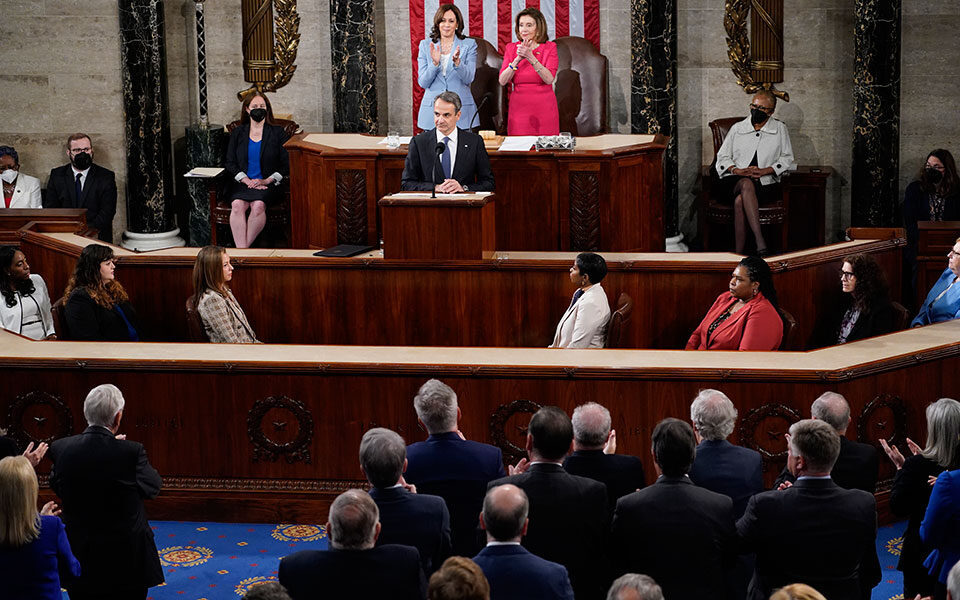Greek PM Mitsotakis reaffirms strong bonds uniting Greece and US

Prime Minister Kyriakos Mitsotakis reaffirmed the strong historical bonds uniting Greece and the United States while also touching on several important issues including the Russian invasion of Ukraine and Turkey’s conduct in the Eastern Mediterranean in an historic address to a joint session of the US Congress on Tuesday.
“I come before you to celebrate a miracle that all free people cherish but that binds Greeks and Americans in a unique way. That miracle, the Greek idea that would forever change the world, is that society functions best if all citizens are equal and have the right to share in running their state. In a word, democracy,” Mitsotakis said.
Noting that the two countries fought “side by side in world wars to defend freedom and democracy,” he said: “Our democracies have struggled with internal demons. We both are countries that endured the horrific pain of civil wars, the desperation of economic crises, but we have emerged stronger and more committed to defend the values that our ancestors gave their lives for.”
Referring to Ukraine’s resistance to the Russian invasion, he told senators and congresspeople that while Greeks “have no animus towards the Russian people with whom we have been bound so closely by faith and history … we simply cannot be indifferent to a struggle that reminds us so much of our own.
“We recognize the importance of taking sides, and we took sides unequivocally, we stand by Ukraine against Putin’s aggression,” he said, pointing to the dispatch of humanitarian aid, arms, and the reception of Ukrainian refugees by Greece.
He said it was vital that Russian President Vladimir Putin not succeed “to send a message to all other authoritarian leaders that historical revisionism and open acts of aggression that violate international law will not be tolerated by the global community of democratic states.”
Turning to the Eastern Mediterranean, particularly the relations of Greece with Turkey, Mitsotakis appealed to Congress to help work towards a solution for Cyprus.
“This language of resentment of revisionism of imperial nostalgia cannot prevail. Speaking of acts of aggression, I ask you … not to forget an open wound that has caused Hellenism unending pain over the past 48 years. I am referring to the invasion and subsequent division of Cyprus,” he said, adding that “this issue has to be resolved in accordance with international law and in line with the relevant decisions of the United Nations Security Council.
“As I told President Biden yesterday, nobody can and nobody will ever accept a two-state solution in Cyprus,” he said, to loud applause in the chamber.
In the context of Greek-Turkish relations, the prime minister called for an immediate halt to Turkish overflights of Greek islands.
Greece is “a peace-seeking democracy that always extends a hand of friendship to our neighbors. We are always open to dialogue but there is only one framework we can use to resolve our differences. International law and the unwritten principles of good unneighborly relations,” he said.
“I want to be absolutely clear. We will not accept open acts of aggression that violate our sovereignty and our territorial rights and these include overflights over Greek islands that must stop immediately.”
Returning to a point made on the first day of his US visit, he said that “the last thing that NATO needs at a time when all focus is on helping Ukraine defeat Russia’s aggression is another source of instability on NATO’s southeastern flank.”
He appealed to US lawmakers “to take this into account when you make defense procurement decisions concerning the Eastern Mediterranean,” a clear reference to reports that US President Joe Biden was considering asking Congress to vote for an upgrade of Turkish F-16 fighter jets.
He also called on Congress to play its part in supporting global democracy.
“We need to strengthen our democratic institutions to address the root causes of the anger and distrust of our citizens. We need to tackle income inequalities without losing the dynamism of our open economies, we need to reform social media so that they become less socially corrosive, and we need to train our young people to seize the opportunities of democratic citizenship in this new age,” he said.
He accepted that the necessity to reinvent “democracy to fit the challenges of the 21st century may sound like a tall order, but this is the mission of our generation.”
Finally, Mitsotakis referred to Greek-American community as the “the unshakeable bond that will always bind our two countries together.”
“Those who sailed to this country were not philosophers and poets like their noble ancestors. For the most part they were simple laborers and they eagerly took any work that they could. But no matter how uneducated the Greeks were or how menial the work was they would typically apply themselves with great determination and embrace any chance to prosper in life and educate their children,” he said of the tens of thousands of Greeks who emigrated to America.
The US “offered them a brighter future, fulfilling the solemn duty that every generation should be able to live a better life than the previous one. They experienced the American dream but never forgot where they came from. Today the Greeks who live in the United States and the three million Americans who identify themselves as Greeks include some of the most respected leaders in the arts, sciences, education, medicine, the judiciary, and politics.”
“I bring you here today the pledge of the Greek people that we stand together with the people of the United States whenever and wherever necessary to ensure that the hopes of our ancestors bequeath to the world 25 centuries ago will endure and that the dream of freedom for every human being on this planet will never die.”
“Long live the friendship between Greece and the United States of America,” he concluded.
Source: ekathimerini.com





